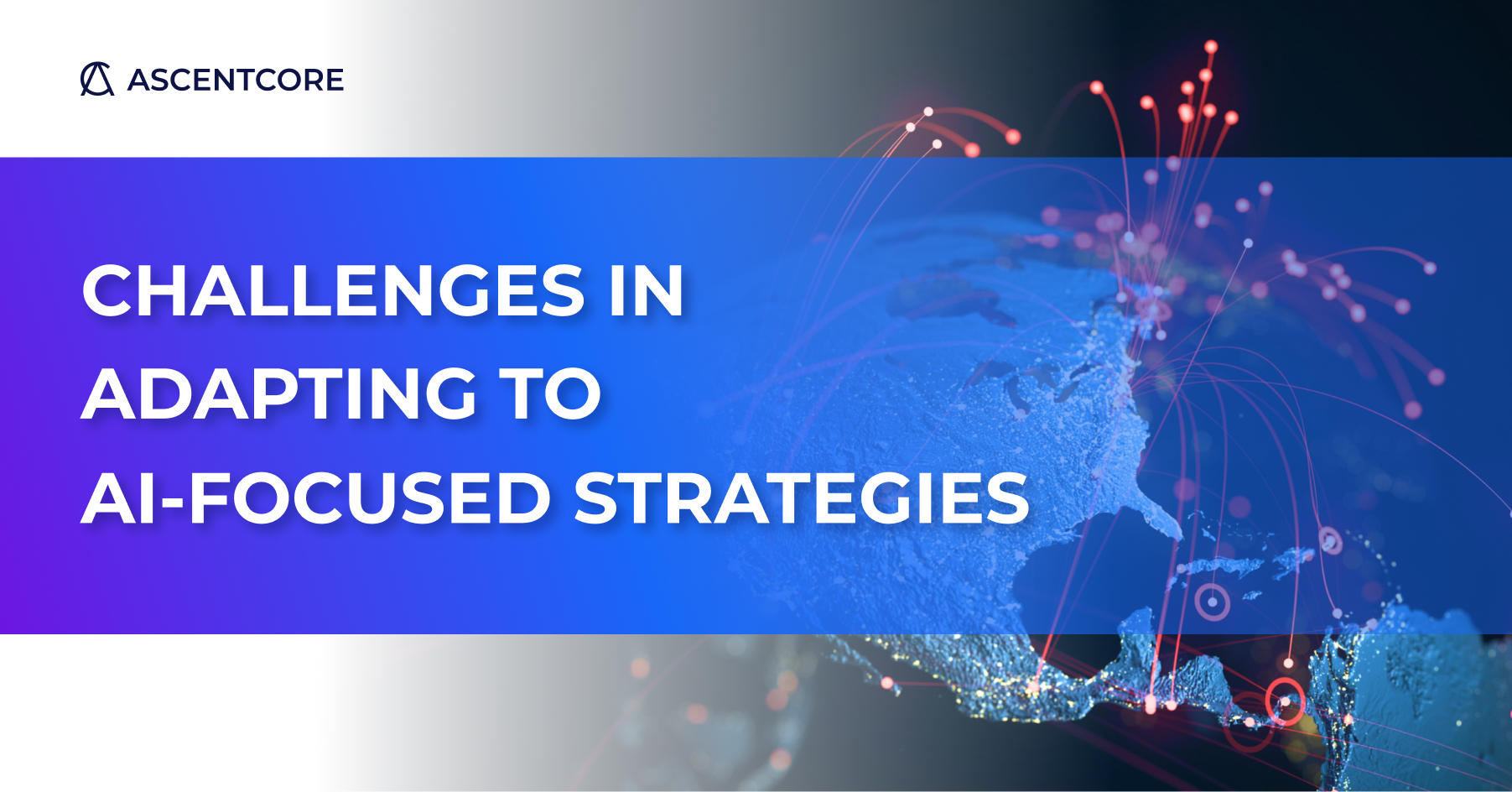Artificial Intelligence (AI) is revolutionizing the business landscape by enabling enterprises to enhance efficiency, innovate, and gain a competitive edge. However, adapting to AI-focused strategies comes with its own set of challenges. Organizations must address several critical aspects, including data quality, integration, and security. Here, we explore these challenges and strategies to overcome them.
Challenges in Adapting to AI-Focused Strategies
Adapting to AI-focused strategies can transform a business, driving innovation and efficiency. However, the journey is fraught with challenges that can hinder progress if not addressed appropriately. From data quality to integration and security, each challenge requires a tailored approach to overcome.
Data Quality: The Bedrock of AI
The Challenge. The effectiveness of AI models hinges on the quality of data. Poor data quality can lead to inaccurate predictions, biased results, and, ultimately, flawed decision-making. Common issues include incomplete data, inconsistent formats, bias, and lack of relevance.
The Solution. To ensure high data quality, organizations should implement robust data governance frameworks, including:
Data Cleaning: Regularly clean and preprocess data to remove inconsistencies and errors. This step is crucial to ensure that the AI models receive accurate and relevant information, thus improving their performance.
Data Enrichment: Augmenting datasets with additional, relevant information to enhance their value. By enriching data, businesses can provide AI models with a more comprehensive understanding of the variables at play, leading to better predictions and insights.
Data Standardization: Establishing and adhering to consistent data formats and standards across a business. Standardization simplifies data integration and analysis, allowing AI systems to work more effectively with unified data.
Continuous Monitoring: Implementing automated tools to continuously monitor data quality and address issues in real time. This proactive approach helps in maintaining high data quality and promptly addressing any anomalies or errors.
Integration: Bridging Silos for Seamless AI Adoption
The Challenge. Integrating AI systems with existing IT infrastructure can be a complex and time-consuming endeavor. Many businesses operate with disparate systems and data silos, making it difficult to unify data and leverage AI effectively.
The Solution. Successful integration requires a strategic approach that includes:
Interoperability: Taking steps to ensure that new AI systems are compatible with existing technologies and can communicate seamlessly. This compatibility is essential for smooth data flow and efficient system operation.
APIs and Middleware: Facilitating data exchange and system integration using APIs and middleware solutions. These tools act as bridges between different systems, enabling them to work together harmoniously.
Data Lakes: Implementing data lakes to consolidate data from various sources into a centralized repository, enabling easier access and analysis. A data lake provides a unified view of data, simplifying the process of extracting valuable insights.
Cross-Functional Collaboration: Promoting collaboration between IT, data science, and business teams to align objectives and streamline integration efforts. Effective communication and teamwork are crucial for overcoming integration challenges and ensuring that AI initiatives align with business goals.
Security: Safeguarding AI Initiatives
The Challenge. AI systems are attractive targets for cyberattacks due to the sensitive data they process and their critical role in decision-making. Ensuring the security of AI models and the data they rely on is paramount.
The Solution. Enterprises should adopt a multi-layered security approach that incorporates the following:
Data Encryption: Protecting data both at rest and in transit to protect it from unauthorized access. Encryption ensures that even if data is intercepted, it remains unreadable to unauthorized parties.
Access Controls: Implementing strict access controls and authentication mechanisms to limit data access to authorized personnel only. By restricting access, businesses can minimize the risk of data breaches and unauthorized use of AI systems.
AI Model Security: Protecting AI models from adversarial attacks by regularly testing and updating them to identify and mitigate vulnerabilities. Continuous testing helps in identifying weaknesses and reinforcing the security of AI models.
Compliance: Ensuring adherence to relevant regulations and standards, such as GDPR, to maintain data privacy and security. Compliance with regulations not only safeguards data but also builds trust with customers and stakeholders.
Incident Response: Establishing a robust incident response plan to quickly detect, respond to, and recover from security breaches. A well-prepared response plan can significantly reduce the impact of security incidents and ensure business continuity.
Address AI Challenges to Stay Competitive
Adapting to AI-focused strategies can help businesses drive innovation and achieve sustainable growth. As the AI landscape continues to evolve, addressing challenges such as data quality, integration, and security issues will be key to maintaining a competitive edge in the digital age. By proactively tackling these challenges, organizations can harness the full potential of AI and stay ahead of the competition.
Overcoming AI Implementation Challenges
AI implementation in businesses can revolutionize operations, driving efficiency and innovation. However, the path to successful AI adoption is strewn with challenges that require careful navigation. From data quality to integration and security, each aspect demands a strategic approach to overcome.
Conclusion
Adapting to AI-focused strategies offers businesses the potential for significant innovation and growth. However, this journey is accompanied by challenges related to data quality, integration, and security. By addressing these challenges of adapting to AI-focused strategies through strategic approaches and robust frameworks, organizations can successfully harness the power of AI, driving efficiency and maintaining a competitive edge in the ever-evolving digital landscape.



